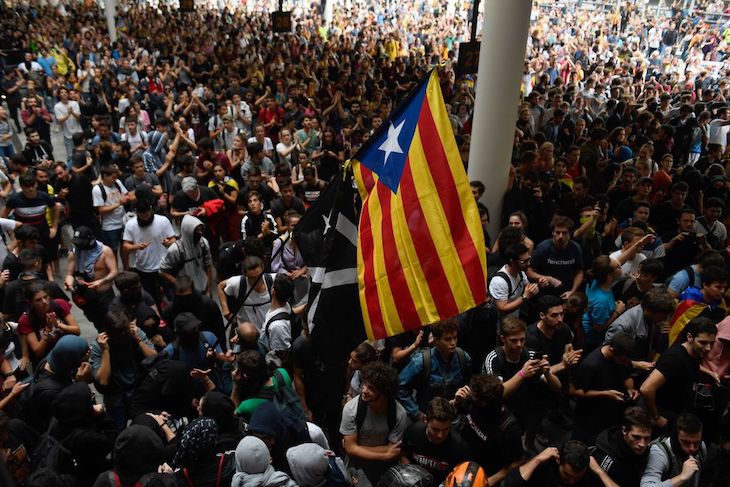Some things just don’t pass the gut test. Your head tells you they’re right, all the facts point in their favour, but you can’t suppress a dyspeptic rumbling. The jailing of Catalan separatist leaders should give us all political indigestion. On Monday, Spain’s Supreme Court sentenced 12 activists and key figures from the autonomous government and parliament of Catalonia, all of whom helped organise an illegal referendum in October 2017 to secure independence for the Spanish region. Nine defendants, including former ministers and the parliamentary speaker, were jailed for up to 13 years for offences including sedition and misuse of public funds. Three others were fined for lesser offences.
The convicts are being branded ‘political prisoners’ by their sympathisers at home and abroad, but there is no suggestion that their trials were anything but procedurally and constitutionally proper. They have not been jailed for their ideological objectives but for flouting the law to achieve them. Madrid’s constitution, rooted in ‘the indissoluble unity of the Spanish Nation’, does not allow autonomous regions to hold breakaway votes without permission. The Constitutional Court suspended the separatists’ referendum law before polling day pending legal proceedings. In choosing to press on after that, the secessionists not only defied the law and the courts but the right of Catalans, nationalist and pro-union alike, to decide their future lawfully.
There is a muckle of hypocrisy on the go right now. Many who would be giddy at the prospect of Boris Johnson doing porridge for ignoring the Benn Act see an ominous authoritarianism in the Spanish sentences. The Venn diagram of those who believe that neither Johnson nor Carles Puigdemont should be above the law would be quite the sight.
I wrote on the day of the Catalan referendum that the brutal police response was ‘a textbook example of how not to deal with secessionists.’ I said so not as a sympathiser with Catalan nationalism (far from it) but as an unhappy democrat. The Catalan separatists are, broadly speaking, a wrong lot and express prejudices that their apologists do not tolerate in nationalist movements closer to home. But, however objectionable their views, however lamentable their aims, however unconstitutional their methods on this occasion, they were, in the end, only trying to vote.
Law is ordered liberty and the working out of the tensions between the two. Without order, liberty eventually self-destructs but when order denies a liberty as basic as the vote, the freedom to choose who governs you, it offends something atavistic, something that claims a more intimate loyalty than mere law — a sense of justice. This instinct is why civil disobedience exists and, for Catalan nationalists, the unlawful referendum of October 2017 was an act of civil disobedience in the name of democracy. Spain’s political system will not allow a binding referendum any other way.
You need not accept the separatists’ logic to understand the ideals and impulses that animate their cause, and when you see their struggle through their eyes you see it also through the eyes of history. Democracy is the oldest rebellion and the rebels almost always outlast, then replace, those they rebel against, be that tyrannical clerics, capricious monarchs, or bureaucratic totalitarians. Spain is, of course, none of those but it cannot hope to crib their tactics while avoiding their results.
All that is a gusty way of repeating what I have already said: they were only trying to vote. They broke the law and misused taxpayers’ money to do it but it was a rogue ballot, not Ocean’s Eleven, and there was almost no chance of translating the result into formal secession. Leaving aside Spain’s far superior institutional, police, and military might, the vote was 92 per cent. Yes on a 43 per cent turnout after anti-independence voters boycotted. The outcome has been treated by the international community as if it carries all the democratic weight of a hastily arranged show of hands.
Spain’s laws are Spain’s affair but what a showing up Madrid has given itself. You can’t lock people up for doing democracy wrong. You can, but you will eventually become a pariah or a laughing stock or both. This is not a question of optics or contributing martyrs to Catalan nationalism but one of democratic confidence. Nations secure in the health of their democracy do not jail their non-violent separatists. Dock their funding, retrench their powers, prorogue their assembly, but don’t jail them. When you jail them, you are saying the cellblock is the only argument you have left.
There is a lesson in this for devolutionists. Catalan autonomy enjoys an older pedigree than Scottish devolution but they share a fundamental characteristic, either an advantage or a flaw depending on your political inclination: Their very existence concedes a rival source of political legitimacy to that of the central state. It doesn’t matter all that much whether we’re talking about a unitary state like Spain or a constitutional mutant like the UK system, which, no matter how many textbooks say it, still isn’t a unitary state. Partial self-determination can slip with ease, if not with speed, into something that is no longer partial.
There is a lesson too for supporters of the European project. The EU is damned if it meddles in the sovereignty of member-states and damned if it doesn’t, but a body ever-boastful for its ‘values’ needs a better line on these events than the Commission’s pronouncement that the jailings are ‘an internal matter for Spain’. If Brexit is proof of Britain’s turn against Europe’s liberal and democratic ideals, how are we defining liberalism and democracy? Should Nicola Sturgeon attempt the same stunt as Barcelona’s separatists, the harshest reprisal awaiting her would be severe tutting, possibly escalating to a studious ignoring. Perhaps Europe could learn something from us on how to deal with separatist malcontents.







Comments